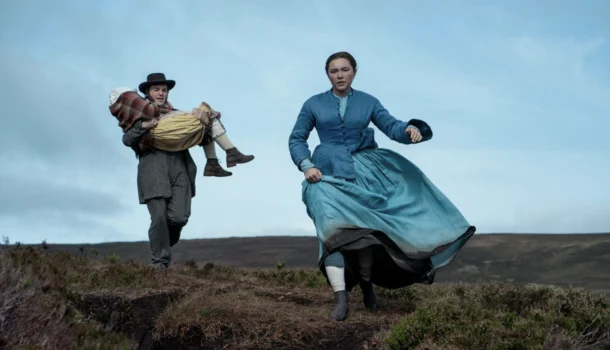There are films that refuse to merely depict the world — they choose to confront it. In “The Wonder”, Sebastián Lelio rejects the comfort of linear storytelling to construct a moral fable that destabilizes the viewer’s certainties. Inspired by the novel by Emma Donoghue, the screenplay is set in 1862 Ireland, yet its resonance is timeless. It is an exercise in intellectual unrest, where faith, science, and trauma intertwine in a weave of ethical clashes and psychic collapse. At its core lies not just a mystery, but the implosion of the very instruments we rely on to decipher it.
The protagonist, Elizabeth Wright — portrayed with restrained intensity by Florence Pugh — embodies a reason hardened by experience. Her mission: to observe a girl who allegedly has survived without food for four months. Her role is cloaked in procedural neutrality. Yet it is in the friction between this clinical mindset and the village’s religious fervor that the narrative acquires its true weight. This isn’t a simple opposition between science and faith; it is a mapping of the chasm between what we see and what we believe, between method and miracle, between trauma and transcendence.
The village housing the mystery functions like a symbolic capsule, where time seems suspended and certainties dissolve. There, Elizabeth is confronted not only by the community but by a distorted reflection of herself. As her bond with the enigmatic Anna deepens, the scientific framework of observation collapses. What began as clinical inquiry turns into an existential labyrinth. The child’s frail body becomes a metaphor for a diseased faith — one not built for comfort, but for punishment. And faced with that self-consuming devotion, Elizabeth is forced to recalibrate her own ethical compass.
Far from providing answers, Sebastián Lelio dismantles the conventions of the period drama by incorporating metalinguistic strategies. From the outset — when the film set is revealed and a narrator warns us of the fiction ahead — the director makes clear that we’re not merely witnessing a story, but a commentary on storytelling itself. This breaking of the fourth wall operates not as a stylistic flourish but as an epistemological provocation: who controls the version of events? Where does the viewer’s trust anchor itself? What unseen filters distort our concept of “truth”?
This metanarrative layer resonates deeply with the present. Though set in the 19th century, “The Wonder” mirrors the dilemmas of a contemporary society overwhelmed by information noise and manufactured truths. The village’s faith — unquestioning, communal, ritualistic — finds disturbing parallels in today’s digital echo chambers and the viral spread of baseless beliefs. The same logic that transforms a child’s fasting into a spectacle of veneration sustains the uncritical idolatry seen on social media. Thus, the character’s literal hunger becomes a metaphor for a highly modern symbolic void: the absence of lucid doubt, fertile hesitation, and the refusal to accept facts at face value.
The film’s strength lies not in solving its mystery, but in its refusal to close off its questions. Rather than resting on morally or factually stable answers, “The Wonder” places the viewer on unstable ground, where each decision demands the sacrifice of a previous conviction. In this ambiguous terrain, faith and reason are not adversaries but forces in tension — each exposing the limitations of the other.
This is not a film to be passively consumed — it demands to be digested slowly, like someone crossing a minefield of certainties. It offers not contemplative solace, but a productive discomfort. In the end, there is no verdict — only a question: when truth becomes performance, where does the responsibility of the viewer lie? And that’s when Lelio unsettles us completely: perhaps the answer, if there is one, lies less in the miracle itself than in the courage to dismantle it.
Film: The Wonder
Director: Sebastián Lelio
Year: 2022
Genres: Drama / Mystery / Thriller
Rating: 10/10

